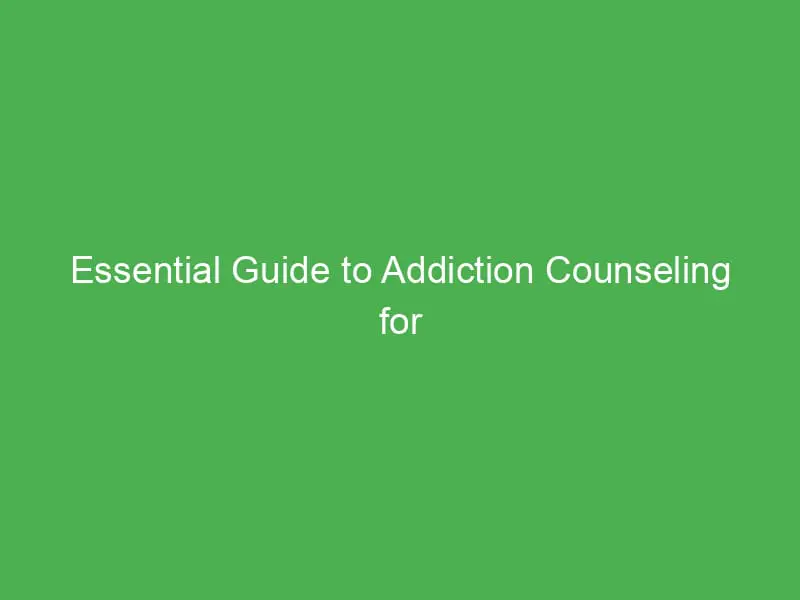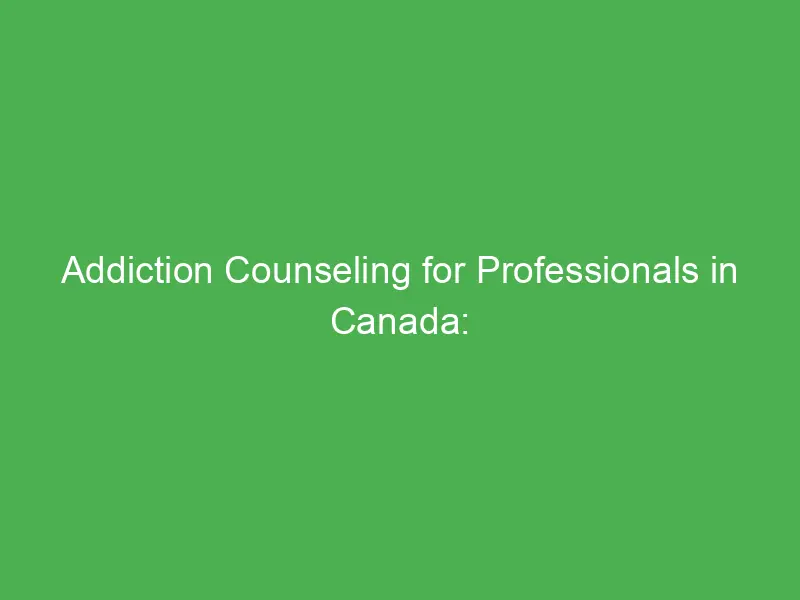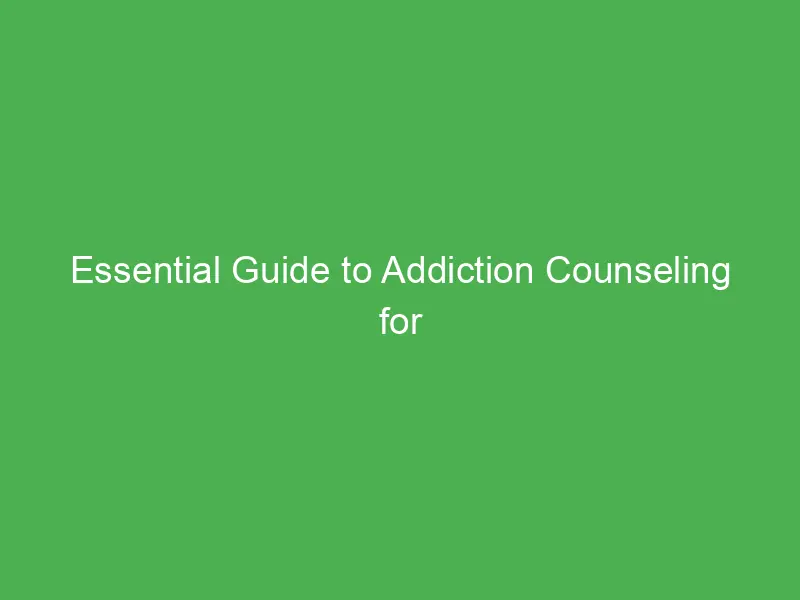In Australia, addiction counselling plays a crucial role in supporting individuals battling substance use disorders. As the landscape of addiction evolves, professionals in this field must stay informed and equipped with the latest strategies and insights. Understanding the nuances of addiction not only enhances their effectiveness but also fosters a compassionate approach to treatment.
With a growing demand for skilled counsellors, the need for specialised training and resources has never been more vital. Professionals are called to navigate the complexities of addiction while providing a safe space for clients to share their struggles. This article delves into the essential aspects of addiction counselling for professionals in Australia, highlighting best practices and emerging trends that can make a significant difference in the lives of those seeking help.
• What is addiction counseling for professionals in Australia?
Addiction counseling for professionals in Australia involves specialised support aimed at those struggling with substance use disorders. It encompasses several key steps and principles designed to enhance the effectiveness of treatment.
- Assessment: Counselors start with a thorough assessment of the individual’s situation. This includes evaluating their substance use patterns, psychological state, and social circumstances, helping to formulate a tailored treatment plan.
- Intervention: Professionals utilise various intervention strategies to engage clients. Techniques such as motivational interviewing can help facilitate discussions about change, empowering clients to take actionable steps toward recovery.
- Counselling Techniques: Effective addiction counselling employs evidence-based techniques. Cognitive-behavioural therapy (CBT) is frequently used to address thought patterns and behaviours linked to addiction. Dialectical behaviour therapy (DBT) is also beneficial in managing emotional regulation.
- Support Services: Counselors often connect clients with additional support services, including group therapy and medication-assisted treatment. Referral to external resources can provide a holistic approach to recovery.
- Relapse Prevention: Professionals focus on relapse prevention strategies, educating clients on coping mechanisms and stress management techniques to sustain long-term recovery.
- Ongoing Education: Staying current with the latest research and trends is vital for addiction professionals. Engaging in continuous professional development helps improve counselling skills and treatment methods.
- Cultural Sensitivity: Understanding the cultural context is crucial in Australian addiction counselling. Tailoring approaches to fit the unique backgrounds of clients enhances the therapeutic relationship and overall effectiveness.
- Confidentiality: Maintaining strict confidentiality is essential in creating a safe environment for clients. Professionals adhere to ethical guidelines to foster trust throughout the counselling process.
Addiction counseling for professionals in Australia seeks to provide targeted support, utilising these steps to effectively address the complexities of substance use disorders and help clients on their path to recovery.
• Benefits of addiction counseling for professionals in Australia
- Enhancing Skills and Knowledge
Addiction counselling improves professionals’ skills, equipping them with evidence-based methods to treat clients effectively. Continuous education and training in new therapeutic techniques ensure counsellors remain competent in a rapidly evolving field.
- Supporting Client Recovery
Professionals gain insight into developing tailored strategies, fostering a compassionate approach that significantly contributes to clients’ recovery journeys. Building rapport and trust enables clients to express their struggles openly.
- Reducing Stigma
Engaging in addiction counselling helps professionals challenge societal stigma surrounding substance use disorders. By promoting understanding and compassion, professionals foster an environment where clients feel safe to seek help.
- Preventing Burnout
Addiction counselling offers professionals tools to manage their emotional well-being. Techniques such as mindfulness and self-reflection enable them to navigate the emotional demands of their work, effectively reducing burnout rates.
- Collaborating with Other Services
Professionals gain the ability to coordinate care with other health services, such as mental health and medical providers. Networking enhances clients’ access to holistic support, streamlining their recovery process.
- Improving Employment Outcomes
Specialised training and skills development in addiction counselling enhance job prospects for professionals. Employers in various sectors, including healthcare and community services, actively seek candidates with expertise in addiction treatment.
- Cultural Competency
Successful addiction counselling includes cultural sensitivity training. Professionals learn to respect and understand diverse backgrounds, which is crucial for effective communication and engagement with clients from various communities.
- Boosting Confidence
Completing certification in addiction counselling instils confidence in professionals. This confidence translates into their practice, empowering them to tackle complex client situations with competence and assurance.
- Fostering Long-term Client Relationships
Continuous counselling fosters long-term relationships between professionals and clients. This ongoing connection provides lasting support, encouraging clients to maintain sobriety and avoid relapse.
- Staying Current with Trends
Participating in addiction counselling ensures professionals remain updated with the latest research and trends. Regular training helps them adapt to emerging challenges in the field and refine their approach to treatment.
• How to Find the Best addiction counseling for professionals in Australia
- Research Qualifications
Professionals should consider the qualifications of potential addiction counsellors. Look for counsellors with relevant credentials, such as a degree in psychology, social work, or counselling, along with specialised training in addiction treatment.
- Assess Experience
It’s essential to evaluate the experience of a counsellor. Professionals should seek those who have worked specifically with addiction and have a proven track record in the field. Prior experience with similar client demographics can be particularly beneficial.
- Check for Accreditation
Verify whether the counselling service is accredited by recognised bodies, such as the Australian Counselling Association (ACA) or the Psychotherapy and Counselling Federation of Australia (PACFA). Accreditation indicates adherence to professional standards and ethical guidelines.
- Evaluate Treatment Approaches
Understand the treatment approaches used by the counselling service. Professionals should inquire about evidence-based practices, such as Cognitive-Behavioural Therapy (CBT) or Motivational Interviewing, and ensure these align with the needs of their clients.
- Explore Availability and Accessibility
Availability of counselling services plays a crucial role in effectiveness. Professionals should consider the flexibility of appointment times, the location of the service, and whether telehealth options are available for convenience.
- Seek Referrals and Reviews
Networking within the professional community can provide valuable insights. Obtaining referrals from trusted colleagues or reading reviews of counselling services can guide professionals toward the most suitable options.
- Prioritise Cultural Competency
Understanding different cultural backgrounds is vital in addiction counselling. Professionals should seek counsellors who demonstrate cultural sensitivity and competence, ensuring they can effectively support diverse client populations.
- Consider Costs and Insurance
Budgeting for counselling is essential. Professionals should inquire about session costs, payment plans, and whether the service accepts health insurance or government assistance programs to ensure affordability.
By following these steps, professionals can identify the best addiction counselling options available, enhancing their ability to support individuals struggling with substance use disorders in Australia.
• Best Practices for addiction counseling for professionals in Australia
- Prioritise Empathy and Understanding
It’s essential for professionals to approach clients with empathy, creating a safe space for open dialogue. Understanding the unique challenges faced by individuals with substance use disorders fosters trust and encourages honest communication.
- Engage in Active Listening
Professionals should practice active listening by fully concentrating on their clients, clarifying concerns, and reflecting on what is said. This practice allows clients to feel heard, ensuring their experiences and feelings are validated.
- Utilise Evidence-Based Practices
Implementing evidence-based approaches, such as cognitive-behavioural therapy (CBT) and motivational interviewing, equips professionals with effective tools to address addiction. Staying informed about recent research enhances treatment effectiveness.
- Focus on Personalised Treatment Plans
Developing tailored treatment plans that consider individual circumstances is crucial. Professionals should assess each client’s needs and preferences, adjusting strategies to promote successful recovery.
- Incorporate Relapse Prevention Strategies
Professionals must integrate relapse prevention techniques into counselling sessions. Fostering skills for coping with triggers and high-risk situations empowers clients to maintain recovery in the long term.
- Ensure Cultural Competence
Understanding and respecting cultural differences enhances the counselling process. Professionals should strive to provide culturally sensitive care, adapting their approaches to accommodate clients’ backgrounds and values.
- Encourage Holistic Support
Connecting clients with additional support services, such as peer support groups or mental health resources, facilitates comprehensive care. A holistic approach addresses various aspects of a client’s life, promoting sustained recovery.
- Commit to Ongoing Professional Development
Engaging in continual education and training ensures professionals remain updated on the latest trends and techniques in addiction counselling. Such commitment enhances their ability to provide effective and informed care.
- Practice Self-Care
Professionals should prioritise self-care to avoid burnout. Implementing strategies like regular supervision, peer support, and personal therapy can maintain emotional well-being and high-quality service delivery.
• Common Challenges with addiction counseling for professionals in Australia
- High Demand for Services
Professionals often face a surge in demand for addiction counselling services. This increased workload can lead to stress, reduced quality of care, and potential burnout, making effective time management essential.
- Lack of Resources
Many counsellors encounter limitations in resources, such as funding and access to support networks. Limited availability of specialised training can hinder the ability to stay informed on best practices.
- Stigma Surrounding Addiction
Addiction still carries a significant stigma, impacting clients’ willingness to seek help and counsellors’ ability to engage effectively. Educating communities about addiction as a health issue can help reduce this stigma.
- Complex Client Needs
Clients often present with co-occurring mental health disorders or complex social issues. Professionals need specialised skills in tailored treatment plans that address not just addiction but also these accompanying challenges.
- Cultural Sensitivity
Australia’s diverse population requires counsellors to practise cultural competence. Understanding different cultural perspectives on addiction is crucial for building trust and ensuring effective communication.
- Relapse Management
Handling relapse can be challenging for both professionals and clients. Implementing robust relapse prevention strategies and educating clients on recognising triggers can enhance recovery outcomes.
- Confidentiality Concerns
Professionals must navigate the delicate balance of maintaining client confidentiality while collaborating with other health services. Clear protocols and informed consent processes are necessary to uphold clients’ privacy.
- Ongoing Professional Development
Staying updated on emerging research trends can be challenging amidst busy schedules. Engaging in continuous education and peer support groups can help professionals remain well-informed and enhance their counselling practices.
Key Takeaways
- Importance of Addiction Counselling: Addiction counselling in Australia provides essential support for individuals with substance use disorders, emphasising the need for well-informed and empathetic professionals.
- Core Counselling Techniques: Effective addiction counselling incorporates evidence-based practices such as Cognitive-Behavioural Therapy (CBT) and Motivational Interviewing, aimed at fostering client engagement and recovery.
- Cultural Sensitivity: Tailoring counselling approaches to respect diverse cultural backgrounds enhances client relationships and overall treatment effectiveness.
- Relapse Prevention: Professionals focus on educating clients about coping mechanisms and relapse prevention strategies, which are vital for sustaining long-term recovery.
- Ongoing Professional Development: Continuous education and training are crucial for keeping addiction counsellors updated with the latest research and practices in the field.
- Client-Centric Approach: Personalised treatment plans and holistic support systems significantly improve outcomes, allowing professionals to address the unique needs of each client effectively.
• Conclusion
Addiction counselling plays a vital role in supporting individuals facing substance use disorders in Australia. As the demand for skilled professionals continues to rise it’s essential for counsellors to engage in ongoing education and training. This not only enhances their effectiveness but also fosters a compassionate and culturally sensitive approach to treatment.
By prioritising evidence-based practices and personalised care plans professionals can significantly improve recovery outcomes for their clients. The integration of robust relapse prevention strategies and collaboration with other health services further enriches the support available.
Ultimately the commitment to professional development and self-care ensures that addiction counsellors can navigate the complexities of their roles while providing high-quality care. This dedication not only benefits the professionals themselves but also the individuals they strive to help on their journey to recovery.
Looking for more sober travel inspiration? Find your next adventure on our Homepage.
Frequently Asked Questions
What is addiction counselling?
Addiction counselling is a therapeutic process aimed at helping individuals overcome substance use disorders. It involves assessing clients’ circumstances, developing personalised treatment plans, and using evidence-based techniques like cognitive-behavioural therapy to support recovery.
Why is addiction counselling important in Australia?
It is vital because it provides essential support for individuals struggling with addiction, reducing stigma, facilitating recovery, and connecting clients with necessary resources. With the rising demand for skilled professionals, effective counselling is critical for enhancing treatment outcomes.
What techniques are commonly used in addiction counselling?
Counsellors often employ strategies like motivational interviewing, cognitive-behavioural therapy (CBT), and dialectical behaviour therapy (DBT) to address addiction. These evidence-based practices help clients develop coping skills and positive behaviours to maintain recovery.
How can professionals stay updated on addiction counselling trends?
Ongoing education and training are essential for professionals to stay current with research and best practices. Attending workshops, conferences, and pursuing specialised certifications helps counsellors enhance their skills and knowledge in addiction treatment.
What should individuals consider when looking for addiction counselling services?
Key factors include the qualifications and experience of the counsellor, accreditation from recognised bodies, treatment approaches, cultural competency, and the overall accessibility of services. Reviews and referrals can also provide insight into the effectiveness of the counselling.
What are the benefits of specialised training for addiction counsellors?
Specialised training equips counsellors with the latest strategies and evidence-based methods, improving client outcomes. It enhances cultural competency, promotes emotional well-being, and fosters the development of tailored strategies that better support client recovery.
What common challenges do addiction counselling professionals face?
Counsellors often encounter high demand for services, risk of burnout, lack of resources, and stigma surrounding addiction. Additionally, they must navigate clients’ complex needs, particularly those with co-occurring mental health disorders.
How is cultural sensitivity addressed in addiction counselling?
Cultural sensitivity is crucial for effective communication and building trust with clients. Counsellors are encouraged to develop awareness of diverse cultural backgrounds and tailor their approaches to ensure respectful and relevant care for all individuals.

Quit drinking on 23 July 2021 after a two-day bender and swapped bars for border crossings and 12-step meetings. Three sober years, 36 countries, 113 travellers (totally dry), fuelled by street food, jelly babies, and a broken Google Maps app. Wandersober is my journal, my SEO lab, and my mission. Featured in GQ, Mirror, Evening Standard, MarketWatch, and more.






